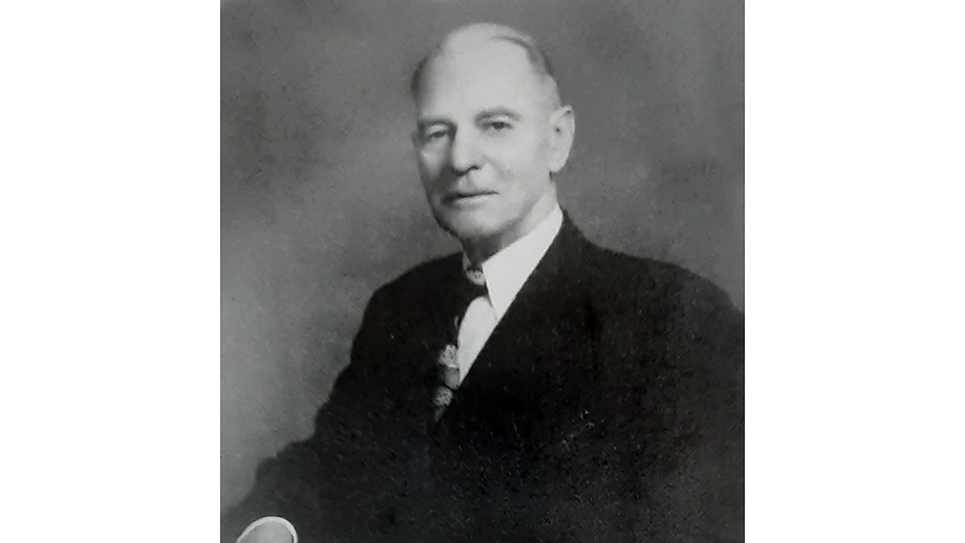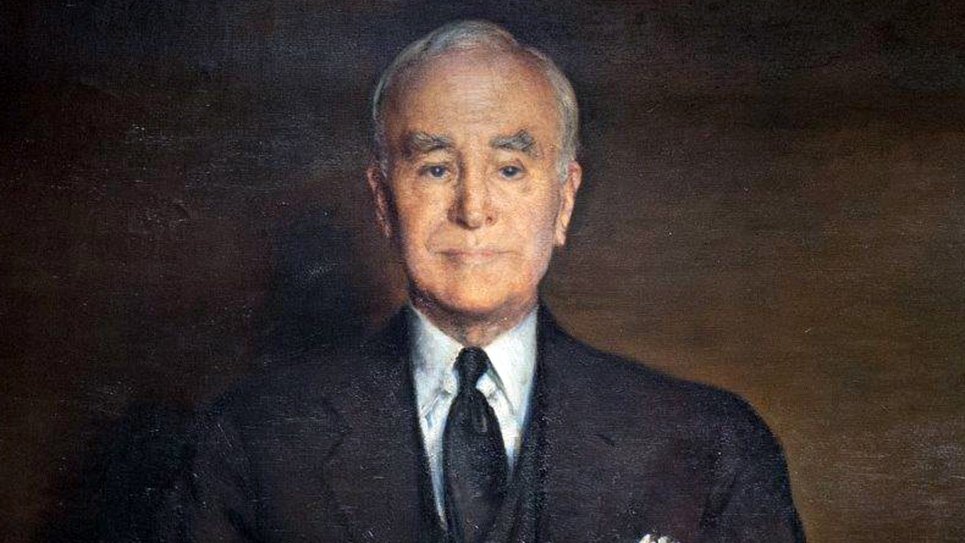Bert H. Miller of Idaho
By Ray Hill
Numerous individuals have enjoyed very long congressional careers, serving decades in Washington. Bert H. Miller was not one of them. Aside from appointments to the United States Senate, which are frequently intended to be temporary, I have marveled at the truncated service of some of those members who have been elected to the Senate. Of course, death finds us all in the end, and it waits for no one. J. Melville Broughton, a former governor of North Carolina, had long planned to run for the U.S. Senate in 1948 only to see death take the incumbent, Josiah W. Bailey in 1946. Governor R. Gregg Cherry appointed former Congressman William B. Umstead to fill the vacancy, forcing Broughton to run against an incumbent. Umstead proved to be hard to beat and the former governor had to work mighty hard indeed to win the Democratic primary. The 60-year-old Broughton took office on December 31, 1948, and served until March 6, 1949, when he died from a heart attack.
A medium-sized man with a thatch of hair turning white, Bert H. Miller was seldom seen without a cigar in hand. A good mixer with a firm handshake, Miller enjoyed people, which is a mighty good quality in someone seeking a career in elective office.
While Bert H. Miller did not serve for a long time in the U.S. Senate, he did enjoy a rather lengthy political career in his home state of Idaho. A lawyer, Miller went to law school in Lebanon, Tennessee, at the famed Cumberland School of Law. Miller was elected prosecuting attorney for Fremont County, Idaho, in 1912 and served until 1914 when he ran for Congress when the Gem State was electing two congressmen at-large. Miller lost that election and he made at least one other try before finally being sent to the nation’s Capitol.
Following his failed congressional campaign, Bert Miller concentrated on his law practice and became one of the leading criminal lawyers in the Gem State. Miller won notoriety from his law cases and offered himself as a candidate for state attorney general in 1932. It was a Democratic year and Bert H. Miller was elected and reelected in 1934. Miller watched as a former assistant, D. Worth Clark, won a seat in the U.S. House of Representatives at age 32. Miller opted not to seek reelection as attorney general in 1936 but rather entered the Democratic primary for governor. Bert Miller campaigned hard but lost the primary election to Barzilla Worth Clark, uncle of Congressman D. Worth Clark.
Two years later, the irrepressible Miller tried for a political comeback, winning the 1938 Democratic nomination to succeed his former employee D. Worth Clark, who was running for the United States Senate, as congressman from Idaho’s Second Congressional District. Republicans were finally beginning to make a comeback nationally and Bert Miller lost to general election to Henry Dworshak.
In 1940, Miller was out on the political hustings once again, seeking to return to the attorney general’s office. Miller won both the primary and general elections and was reelected in 1942. Apparently finding private life distasteful compared to public life, Miller became a candidate for the Idaho Supreme Court in 1944, which was a non-partisan election. Bert Miller’s constant campaigning, as well as his time in public office, had given him considerable name recognition in the Gem State and it is hardly surprising he led the ticket of those seeking nomination to four seats on Idaho’s Supreme Court. Miller ran first, followed by incumbent Chief Justice Edwin Holden, who ran second.
Following a trip to Washington, D.C., Attorney General Miller told reporters, “If you think it’s hot here, you should try Washington.” Safely elected to the state Supreme Court, Miller went to Phoenix to attend a meeting of state attorneys general and somewhere along the way caught a bad case of the flu which kept him out of his office. Once recovered, Miller hurried to close his office as attorney general and prepare for his inauguration as a justice of the Idaho Supreme Court. “I know of no other office, granted as a gift from the people, including the U.S. Senate, I’d rather have than a place on the Supreme Court bench,” Miller told a visiting newsman.
Former Attorney General Bert H. Miller, accompanied by his traditional legal “sponsor,” former governor and federal Judge Chase Clark, was sworn in as an associate justice of the Idaho State Supreme Court by new Chief Justice James Ailshie. The winter term of the Idaho Supreme Court began the following day.
As a justice of the Idaho Supreme Court, Bert H. Miller authored at least 43 opinions I could locate. One such decision involved the case of Mrs. Floyd Sanders and her three children. Floyd Sanders had been killed in an accident on June 15, 1945. The three children were the late Mr. Sanders’ stepchildren and the decision written by Miller resolved a dispute about whether the youngsters were the legal dependents of Sanders and whether as such, they were entitled to compensation payments. Idaho’s Industrial Accident Board had held that although the three children were in the custody of their father, William Brandenburger, who lived in North Dakota, they were “legal descendants” of Floyd Sanders and therefore entitled to compensation.
The employer of the late Floyd Sanders took exception to the decision of the Accident Board and appealed it, along with the Idaho Compensation Company. The decision of Idaho’s Supreme Court written by Justice Bert Miller affirmed the finding of the state Industrial Accident Board.
Death always reshuffles the political deck and when Senator John Thomas died on November 25, 1945, Idaho’s governor, Charles Gossett, was faced with appointing someone to fill the vacancy until the 1946 election. Thomas had first been appointed himself to serve in the United States Senate in 1928 and was subsequently elected to fill the remaining four years of the term. Defeated for reelection in 1932, Thomas returned to his banking and livestock businesses. John Thomas had been appointed yet again to the Senate following the death of William Borah. Senator Thomas beat singing cowboy and sometime radio entertainer Glen Taylor in the special 1940 election and once again in 1942 for a full six-year term.
Gossett resigned as governor, allowing Lieutenant Governor Arnold Williams to succeed him. In turn, Governor Williams appointed Charles Gossett to the United States Senate. Voters rarely ever tolerate a governor essentially appointing himself to the Senate and Charles Gossett was no exception. Senator Gossett promptly lost the 1946 Democratic primary in the special election to serve out the remaining two years of the late John Thomas’ term. George Donart, the Democratic nominee for the U.S. Senate, lost the general election to GOP Congressman Henry Dworshak. In a strong Republican year, Dworshak won better than 58% of the ballots cast.
Charles Gossett very much wanted to run again in 1948 when Dworshak would once again face Idaho voters for the full six-year term. The former senator held back because friends kept telling him not to run for the U.S. Senate again. That along with the fact apparently the luster of serving on the Idaho State Supreme Court had faded somewhat for Bert Miller. Miller had changed his mind and decided perhaps he very much wanted to sit in a seat in the United States Senate after all. Justice Miller’s ambition to serve in the U.S. Senate was no secret and many of Gossett’s friends worried the former governor and senator couldn’t win the Democratic primary. Bert H. Miller was a veteran politician and an excellent campaigner who had run statewide successfully several times. Most political observers were firmly convinced Bert Miller was a much stronger candidate than George Donart had been. The Idaho Statesman wrote, “One thing is certain. Miller will attract the liberal votes … ” Idaho’s senior U.S. Senator Glen Taylor was the champion of the liberals in the Gem State and had run every two years before winning the election in 1944. The Statesman noted Gossett was far more conservative in his political outlook and would attract few, if any, votes from Taylor’s following in Idaho. The newspaper doubted Gossett’s ability to beat Bert Miller in a primary election as the justice “has some conservative support.” The Statesman concluded Charles Gossett’s only hope of beating Bert H. Miller inside the Democratic primary was if enough Republicans would cross over to support him.
In anticipation of a campaign for the U.S. Senate, Justice Miller quietly traveled to Coeur d’Alene when Senator Taylor came home to Idaho in May of 1948. When asked about it, Miller was a bit evasive, saying he had “talked with Taylor three or four times but about nothing political.” According to the justice, the two had merely just “passed the time of day,” a story most newsmen found highly unlikely. Glen Taylor was moving ever closer to running with former Vice President Henry A. Wallace on a third-party ticket against President Harry Truman. Many justifiably believed Wallace’s Progressive Party had been infiltrated by Communists. Wallace was highly critical of President Truman’s hardline foreign policy with the Soviet Union.
When discussing those probable senatorial candidates whom he found acceptable, Glen Taylor never mentioned Bert Miller’s name.
Eventually, Bert H. Miller was unopposed inside the Democratic primary to face Senator Henry Dworshak in the general election. It would be the second election contest where the two veteran politicians faced one another. The first had been the contest for Congress in 1938, which Dworshak won.
Earl B. Smith, president of Idaho’s Bar Association, lobbed the charge it was “unethical” for Miller to remain on the state Supreme Court while campaigning for the U.S. Senate. When newsmen approached the justice and asked if he had a comment, Miller replied he had “none at all.” Smith maintained Miller was violating the canon, which stated a judge should not be an active candidate for any office other than a judicial office. Clearly, Bert Miller was hedging his bet by keeping his seat on the Supreme Court while challenging an incumbent U.S. senator.
Harry Truman’s underdog campaign for election was successful and he carried Idaho by nearly 6,000 votes. Bert Miller beat Henry Dworshak by just over 3,000 ballots.
Before going to Washington, Idaho Democrats held a victory dinner honoring Senator-elect Bert H. Miller and his wife. In responding to the praise lavished upon him by his fellow Democrats, Miller said he “always felt he would be elected,” although he acknowledged he worried about Truman’s election. The senator-elect told the audience Harry Truman’s victory was “the greatest ever attained, and by one gained singly and alone.”
“It is a grand thing, now that victory has come, that so many of us can sing the song of victory,” Miller exulted. Senator-elect Miller told his fellow Democrats when he went to Washington “you will find me in the front ranks for Harry Truman.” Miller was brimming with optimism, saying he believed there “will be more constructive legislation in the next four years than any other four years in the history of the country.”
Miller lived to see his daughter Patricia Ann married to James Henry Hawley Jr., scion of a pioneer Idaho family. A day or so later, Bert Henry Miller walked down a different aisle on the arm of Senator Elbert Thomas of Utah to take the oath of office as Idaho’s junior U.S. senator. Those had to be some of the happiest times of Bert Miller’s life.
Sixty-nine years old when elected to the United States Senate, Bert Miller was apparently not in robust health from the beginning of his time in Washington, D.C. Miller’s brother John recalled the senator was forced to “conserve his energies” and a heavy cold kept Miller in the Bethesda Naval Hospital for “several weeks” shortly before his unexpected death. Miller died at home from a heart attack on October 9, 1949, having served nine months of a six-year term.
© 2024 Ray Hill







